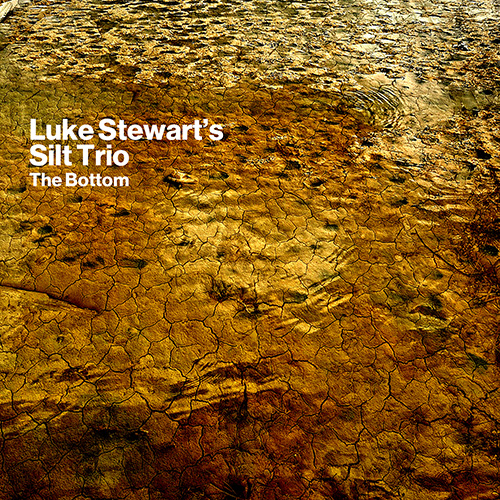As the name suggests, his new Cuneiform album credited to Silt Remembrance Ensemble, brings together two players from his Remembrance Quintet (introduced on an eponymous 2023 album on his own label)– Jamal Moore on reeds and percussion and veteran master Daniel Carter on alto sax and flute–and Silt Trio, featuring powerhouse tenor saxophonist Brian Settles and drum maestro Chad Taylor.
What had initially been planned as an album release concert for the Remembrance Quintet project Do You Remember? evolved into an entirely new situation. Stewart had an opportunity to perform at Tonal Park Studios in Takoma Park, MD, around the same time that Silt Trio was recording Unknown Rivers, “and I used the opportunity to gather this special mix of those two groups,” he says. The recording isn’t a document of the two-hour-plus concert. Rather, Stewart crafted the album after the fact, distilling and sequencing the music to create its own narrative arc, “editing and arranging the performance so that it would make sense in an album form,” he says.
Stewart resides at the center of a tangled skein of relationships running between the four other players. They’re joined on several pieces by spoken word artists Janice Lowe and No Land, with verse that ties this music to the Remembrance Quintet album. They’d both collaborated with Stewart in the multi-disciplinary ensemble Heroes are Gang Leaders. Themes of ancestral recall, the flow of time and water, and the preciousness of shared moments run through the session, starting with the opening convocation “Memory.” A setting for text by No Lands designed to feature Carter, it’s a trio piece with Stewart that prepares the audience for the “molten experience” to come.
The full band joins for “Remember,” a piece harkening to the first Remembrance Quintet album with multilayered percussion and a serpentine saxophone conversation between Carter, Settles and Moore that gathers momentum over the churning rhythm section. A very different sense of motion prevails on “River Road” as Stewart’s heartbeat pulse buoys Carter’s delicate trumpet work. It’s an extended piece that builds to a gale and then gently subsides, an enthralling sojourn intended to highlight Carter’s “unique tone,” Stewart says.
“It puts him in a context he hasn’t usually been in over the past few decades, bringing his sound into a different world and letting him shine. He’s the wind guiding the river down the road.”
In many ways, the session exists in a multiverse of musical possibilities. The spacious, well-aerated piece “Survive,” which opens with a bass drone and fluttery flute, references In Order to Survive, a band that Carter and bass legend William Parker led with various trumpeters. “All of the names are invitations for rumination as you listen, with multiple meanings,” Stewart says. In much the same way, he doesn’t describe his approach as free improvisation, as many pieces evolve out of specific lines or themes he introduces “but without telling the band what it is,” Stewart says. “I’m trying to anticipate and almost intuit in a focused way, how is this line going to survive in this situation? How will it move the spirit of the ensemble?”
The album’s themes surface explicitly again with Stewart’s recitation on the brief “Repeat,” text with multiple layers of meaning, including the incantatory musical device so often deployed during the session. The title track, a headlong tag-team sprint over broken ground, embodies the mind-meld of two ensembles becoming one, while the hand-percussion powered “Lion’s Den” welcomes the fearless Daniel Carter, who maintains the searing mid-tempo intensity without a scratch. The energy arcs on “Claimed,” a densely packed liberation that speaks to the possibilities of making unfettered choices and the obstacles to that path. It’s an ecstatic performance by all the horn players that bristles with shared purpose.
As if summoning the village after their communal outpouring, “Chain Gang” is an extended, percussion-forward piece that explores multiple approaches to rhythmic improvisation. The title’s obvious reference to forced hard-labor speaks to Jim Crow history and less explicit forms of coercion faced by musicians, though the music itself celebrates the act of self-liberation. With the closing track, “Commandments” Stewart and his companions reconfirm the prime direction, “playing the spirit of the moment, the spirit of the ancestors,” he explains. “You receive the commandments on Mt. Sinai.” It’s a struggle to get there, but these musicians walk the walk, and The Order reflects their triumphant journey.
Stewart’s vision and music has increasingly reached far beyond any location. Last December, he presented a major multimedia work commissioned by New York’s Metropolitan Museum of Art as part of the landmark exhibition “Flight into Egypt: Black Artists and Ancient Egypt 1876–Now.” It was the first time the Met presented a new work in conjunction with an exhibition, and by expanding his Blacks’ Myths duo (with drummer Trae Cruddup) with special guests such as Silt Remembrance’s Jamal Moore, flutist extraordinaire Nicole Mitchell, poets Moor Mother and Thomas Stanley, he created an acclaimed hour-long production with video, dance, and costumes.
“I always try to bring worlds together,” he says. “At the Met, I was bringing together Blacks’ Myths and new collaborations. It’s the same thing with Silt Remembrance Ensemble. Daniel and I are always talks about doing something, and there was this great opportunity to bringing together this multigenerational community.”
A major force on the New York jazz scene since the early 1970s, Carter is a dauntingly prolific saxophonist, trumpeter and flutist who has collaborated with a dazzling constellation of improvisers and ensembles. Best known for his long, multi-faceted collaboration with pianist Matthew Shipp and bassist William Parker, including the quartet Other Dimensions In Music with the late trumpeter Roy Campbell Jr. and drummer Rashid Bakr, he’s recorded more than four dozen albums as a co-leader. Sought after by many leading artists, he’s recorded with DJ Logic, Yoko Ono, The Negatones, Thurston Moore, Yo La Tengo, Soul-Junk, and Anne Waldman. As his 80th birthday approaches on Dec. 28, Carter’s status as a creative force with a singular fire-and-ice aesthetic remains undimmed.
The Order represents another step in Carter’s relationship with Stewart. Born in Florida and raised in Mississippi, Stewart grew up in Ocean Springs, a small town on the coast just east of Biloxi. There was little access or exposure to jazz and improvised music in grade school, and he played alto sax in his junior high and high school concert and marching bands. Taking up electric bass at 13, he played in a punk band with high school friends while delving into electronic music and hip hop. He discovered jazz on his own and started a process of self-education, digging through record bins and sharing discoveries with similarly music-obsessed friends.
“The good part of growing up in Mississippi was not having any sort of big overriding cultural force telling you what to do, which gave us the freedom to explore whatever we wanted to do,” he says. “The group that I found myself in, we were all voraciously into checking out all different types of music.”
Attending the University of Mississippi on scholarship he majored in international studies and minored in music, but a summer internship in Washington turned into a new life path when Hurricane Katrina devasted the Gulf Coast, including his hometown. He transferred to American University and ended up graduating with a double major in international studies and audio production. He arrived in town equally committed to the alto sax and electric bass, until his jazz band professor, Dr. Will Smith, encouraged him to take up double bass. “It was a transition for sure,” Stewart says. “I was fascinated and enamored by investigating this instrument and immediately felt the spirit of it.”
After some informal lessons with veteran players like Herman Burney he started going to jam sessions and connecting with established musicians. His creative development has been rooted in DC’s verdant and often overlooked legacy of Black music and culture. Since then, over nearly the past two decades he’s woven himself into a myriad of scenes and idioms. Stewart played bass and saxophone in the DC-based Afropunk band Laughing Man. As an electronic artist, he’s performed alongside legendary hip hop artist Grap Luva, and D.C. beatmaker Damu the Fudgemunk. He was also a member of the experimental electronic trio Mind Over Matter, Music Over Mind. On the jazz side, he is also a member of Trio OOO, a collaborative ensemble featuring saxophonist Aaron Martin and drummer Sam Lohman. He’s also presented numerous concert series and festivals both independently and via CapitalBop.com, a DC-based jazz website and 501c3 non-profit organization that he co-founded.
For many years, Stewart was the production coordinator for the Pacifica radio station WPFW (89.3 FM) and host of his own weekly eclectic jazz program. Through WPFW he collaborated with seminal figures in music and the fight for social justice, including Chuck Brown, Yusef Lateef, Randy Weston, Muhal Richard Abrams, Juma Sultan, and Amiri Baraka. He credits his work at WPFW and mentorship by veteran DJ Jamal Muhammad with connecting him to the jazz scenes in D.C. and Harlem dating back to the rise of bebop.
Since the mid aughts Stewart has been a presence on the New York scene, engaging in a number of activities and scenes. Based in Red Hook, Brooklyn for the past six years, he has taken part in a community of musicians and organizers while deepening musical relationships. After earning a Master’s degree from the New School, he has worked as an adjunct professor there, teaching “Socially Engaged Artistry” and private lessons in bass, improvisation, and music history.
Each artist in Silt Remembrance Ensemble has burrowed into a similarly rich local scene. A Washington D.C. native, Settles performs regularly with some of modern jazz's leading groups, including Tomas Fujiwara and The Hook Up, Michael Formanek's Cheating Heart and Big Band Kolossus, and bands led by Jonathan Finlayson. A protégé of Stanley Turrentine, he released two albums as a leader focusing on his buoyant, pithy compositions. On 2011’s award-winning Secret Handshake (Engine) he featured the quintet Central Union, and followed up with 2013’s trio album Folk (Engine).
A force on the vibrant Baltimore music scene, Moore forged a distinctive vision doing graduate work at Cal Arts, studying and playing with Wadada Leo Smith, Michael Session and Jesse Sharp in the Pan Afrikan Peoples Arkestra, and the late Calvin Gantt and Nicole Mitchell in the Calvin Gantt Ensemble. A member of the politically charged Konjur Collective, Moore has turned his studio in the roiling Baltimore performance space Le Mondo into a bustling creative hub.
It’s hard to overstate Taylor’s contributions to improvised music over the past three decades. A composer, scholar and educator as well as a capaciously inventive percussionist now living in Philadelphia, Taylor is probably best known as co-founder of the Chicago Underground Duo with trumpeter Rob Mazurek (and the numerous Underground iterations that have spun off of that original partnership). A professional on the Chicago scene from the age of 16, he became a rhythmic muse for many of the most celebrated artists in improvised music, including Fred Anderson, Pharoah Sanders, Nicole Mitchell, Matana Roberts, Ken Vandermark, Darius Jones, James Brandon Lewis, Derek Bailey, Marc Ribot, and Peter Brötzmann. He’s also led numerous acclaimed ensembles of his own, including the trio with Settles and pianist Neil Podgurski he documented on the acclaimed 2020 Cuneiform album The Daily Biological.
Together, these players share a depth of knowledge and spirit of adventure that makes The Order a milestone collaboration that excavates and honors the past while embracing the unknown.
The Order press release


